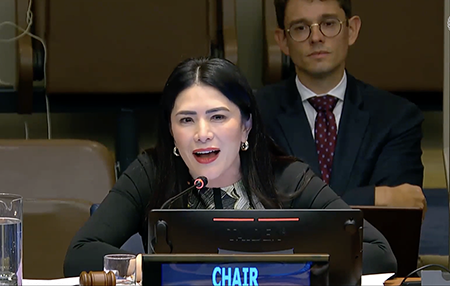"I find hope in the work of long-established groups such as the Arms Control Association...[and] I find hope in younger anti-nuclear activists and the movement around the world to formally ban the bomb."
UN Members Conclude Annual Disarmament Discussion
December 2024
By Shizuka Kuramitsu
The UN General Assembly First Committee authorized three new initiatives concerning nuclear weapons issues during its annual meeting as it sought to advance a commitment to international peace and security.

The committee, which focuses on disarmament and international security, met from Oct. 7 to Nov. 8 in New York amid rising geopolitical tensions and deepening polarization among states. It adopted 77 draft resolutions altogether, including the three new initiatives related to nuclear weapons.
Among the more significant resolutions was a proposal by Ireland and New Zealand to establish an independent scientific panel on the effects of nuclear war. The resolution was adopted 144-3, with 30 states abstaining, including India, North Korea, Poland, and the United States. France, Russia, and the United Kingdom voted no.
Unlike other multilateral disarmament meetings, the First Committee adopts resolutions by a majority vote, not by consensus. The independent scientific panel will consist of 21 members who will be tasked with examining the physical effects and societal consequences of a nuclear war on local, regional, and planetary scales.
“A new U.N.-mandated expert study assessing and addressing the current knowledge of the effects of nuclear war can spur a better-informed, inclusive and much-needed global debate on what nuclear war means for people and the planet,” physicist Zia Mian of Princeton University, a proponent of the study, wrote in Scientific American on Oct. 28.
“It also would help governments and people in nuclear-armed states better understand the nature, scale and severity of the many catastrophic consequences of nuclear war, not just for adversaries but for everyone, including themselves,” Mian added.
Explaining her country’s vote against the resolution, Camille Petit, France’s ambassador to the Conference on Disarmament (CD), said on Nov. 4 that the study group “would not be able to provide new elements to contribute to understanding of the effects of nuclear war” as the devastating consequences are already well known.
Likewise, David Riley, UK ambassador to the CD, said that the international community “always recognized…the devastating consequences” of nuclear war, thus they are not “persuaded of the utility of the independent scientific panel.”
Bruce Turner, U.S. ambassador to the CD, said that the United States also is “clear-eyed about the consequences of nuclear war” and “skeptical of this resolution or [that] the panel’s findings will help move us toward that goal” of no nuclear use.
Nevertheless, Turner said that the United States is “not opposed in principle to a discussion” and would “carefully consider” U.S. participation in this study group process. He stressed that the resolution mandate “must remain unbiased, evidence based…and not be politicized.”
The other new resolutions on nuclear weapons were less contentious. One, advanced by Brazil and Norway, encourages UN member states to engage in a discussion on the establishment of a group of scientific and technical experts on nuclear disarmament verification. It was adopted 173-1 with two abstentions.
The third resolution, proposed by 46 non-nuclear-weapon states, seeks to “convene a qualified group of up to 25 experts…to prepare a new comprehensive study” on nuclear-weapon-free zones. It was adopted 172-2 with three abstentions. The two countries in opposition were Argentina and Israel.
In addition to the three new nuclear-related resolutions, others focused on the topics of the Biological Weapons Convention, the Outer Space Treaty, and autonomous weapons systems. The full General Assembly began acting on the resolutions on Dec. 2.
The First Committee was chaired by Costa Rica’s UN ambassador, Maritza Chan, who served as the committee’s first female chair. “We can only build true security by working together to address the root causes of violence. We must cooperate, not compete with each other in order to survive and thrive in our dynamic world,” she said.
Chan also spoke of the advances women have made in playing a larger role in the First Committee and disarmament generally. “Throughout the history of our work, we have seen that women and a range of diverse stakeholders have brought important insights, experiences, and knowledge for disarmament. We have also been bridge-builders, bringing people together and finding common ground,” she said.
“I hope that the trend of increasing gender perspectives in our statements and resolutions, and including women in meaningful roles within our delegations, continues to the 80th session and beyond,” added Chan.
